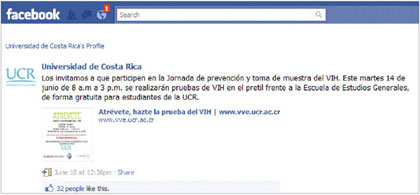Where We Work
See our interactive map

Earlier this summer, the University of Costa Rica organized a one-day, free HIV testing event for students, which they promoted on Facebook.
 |
In response, one student, Paolo*, posted: “Will this [event] be full of transvestites like the other university activities? If so, tell me so that I don’t go.”
 |
Paolo’s comment, whether serious or a joke, exemplifies a discriminatory attitude that some people in Central America take towards nontraditional gender roles and homosexuality.
The immediate response on Facebook to Paolo’s comment was several other students speaking out in support of the university event and for acceptance of diversity. “Why is it important to know if there will or won’t be transvestites. They, like everyone else, have rights. Don’t be homophobic; at this university there’s zero homophobia.”
 |
Another student responded: “The place will be full of students. Frankly, I couldn’t care less if they’re transvestites, gays, lesbians, heterosexuals, or if they like birds, the color red, Allah or Jesus. Prevention and information are the best tools against HIV that currently exist, and stigma and discrimination have no place in this world.”
 |
A third student posted: “I ask you: do you understand what HIV is, do you know how it’s transmitted? You’re simply reproducing social stigma, and I would also say that you have no idea what this campaign is all about and only want to be included and create controversy by writing a few words. Being part of the LGBTI [lesbian, gay, bisexual, transgender, and intersex] population shouldn’t be associated with one type of infection or another; in any case we are all potential carriers of any STI [sexually transmitted infection]. You should come to the event and meet with experts who can explain these things to you because it’s clear that you don’t know.”
 |
This was the second year the University of Costa Rica held the HIV testing day as well as the second year the Central America Capacity Project collaborated with the university on the event. The event was led by student-peer health educators and experts in reproductive health, who were trained in voluntary counseling and testing, and stigma and discrimination prevention. Students who participated in the event were offered individual and couples pre- and post-test counseling, taught about HIV and other sexually transmitted infections, and given free condoms. The event proved to be a great success: peer educators counseled and tested over 330 students. All of those tested were found to be HIV-negative. The Institutional Commission for HIV/AIDS Prevention, the Office of Health and Wellness, the Pan-American Social Marketing Organization, Population Services International, condom manufacturer Masculan, and various university departments and administrative offices supported the event.
This collaboration with the University of Costa Rica is part of the Central America Capacity Project’s work to make HIV/AIDS counseling, testing, and services more visible and accessible and to advocate that these services be included in an essential health service package. The project works to ensure all people are offered confidential, respectful counseling, testing, care and treatment as well as to encourage the adoption of HIV testing as a routine health care service. The project aims to train over 3,600 health workers in five Central American countries by 2014.
These trainings will prepare health workers to better understand the differences and inequalities between men and women, which may affect both individual and couples counseling. The trainings will also support women’s decision-making power; provide nonjudgmental and nondiscriminatory information, support, and services regardless of the client’s sex, sexual orientation, marital status, or age; respect the client’s right to privacy, comfort, and confidentiality; and encourage the constructive engagement of men in HIV prevention.
Although UNAIDS reports that adult HIV prevalence in Central America is low, numbers vary between 0.3% of the adult population living with HIV in Costa Rica to 2.3% prevalence among adults in Belize. Men who have sex with men, transgender people, sex workers, and young people are among the groups most at risk of infection.1 These groups often have “limited access to...reproductive health programs that provide information, skills, services, and commodities to prevent HIV infection.”2 Persistent homophobia, machismo, social stigma, discrimination, and gender-based violence also contribute to people’s risk of contracting HIV and their fear of seeking HIV prevention and treatment services.
“All forms of discrimination and violence—including transphobia—block access to HIV prevention programs and impact the quality of care for people living with HIV. Working for the respect of human rights is at the core of the HIV response in Latin America,” said Edgar Carrasco, UNAIDS country coordinator in Venezuela at the 41st General Assembly of the Organization of American States, held in June in El Salvador. At this assembly meeting, the Organization of American States also adopted a new resolution that condemns discrimination based on sexual orientation and gender identity and urged member states to stop and prevent such discrimination, a welcome move for the HIV response in this region.3
*Name has been changed for anonymity.
The Central American Capacity Project is led by IntraHealth International and funded by USAID. The project aims to strengthen the capacity of health workers and managers to deliver high-quality, comprehensive HIV/AIDS care and treatment services and to prevent stigma and discrimination against people living with HIV and AIDS.
References
1. UNAIDS. 2010. Report on the Global HIV/AIDS Epidemic. New York: UNAIDS.
2. UNAIDS. March 15, 2011. “Addressing stigma and discrimination and homophobia key to achieving universal access in Latin America.” New York: UNAIDS.
3. UNAIDS. June 30, 2011. “The Organization of American States adopts resolution that condemns discrimination based on sexual orientation and gender identity.” New York: UNAIDS.



